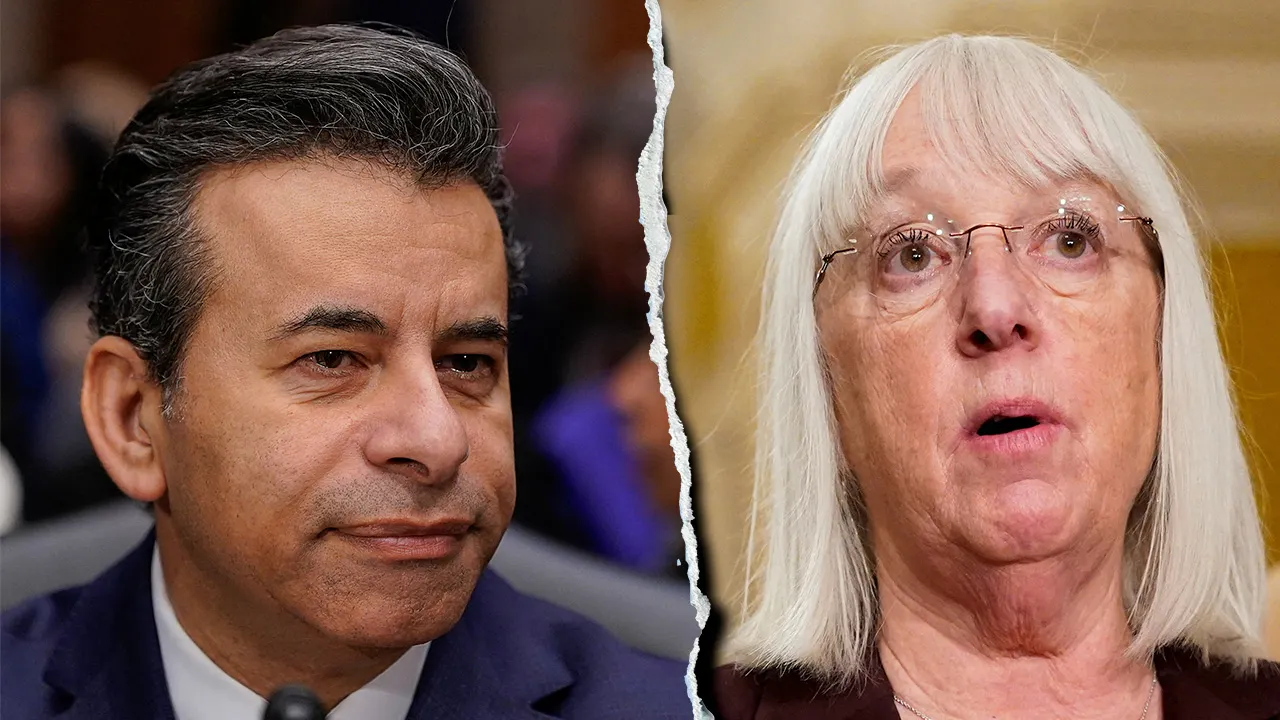World
Western coverage of Israel’s war on Gaza – bias or unprofessionalism?
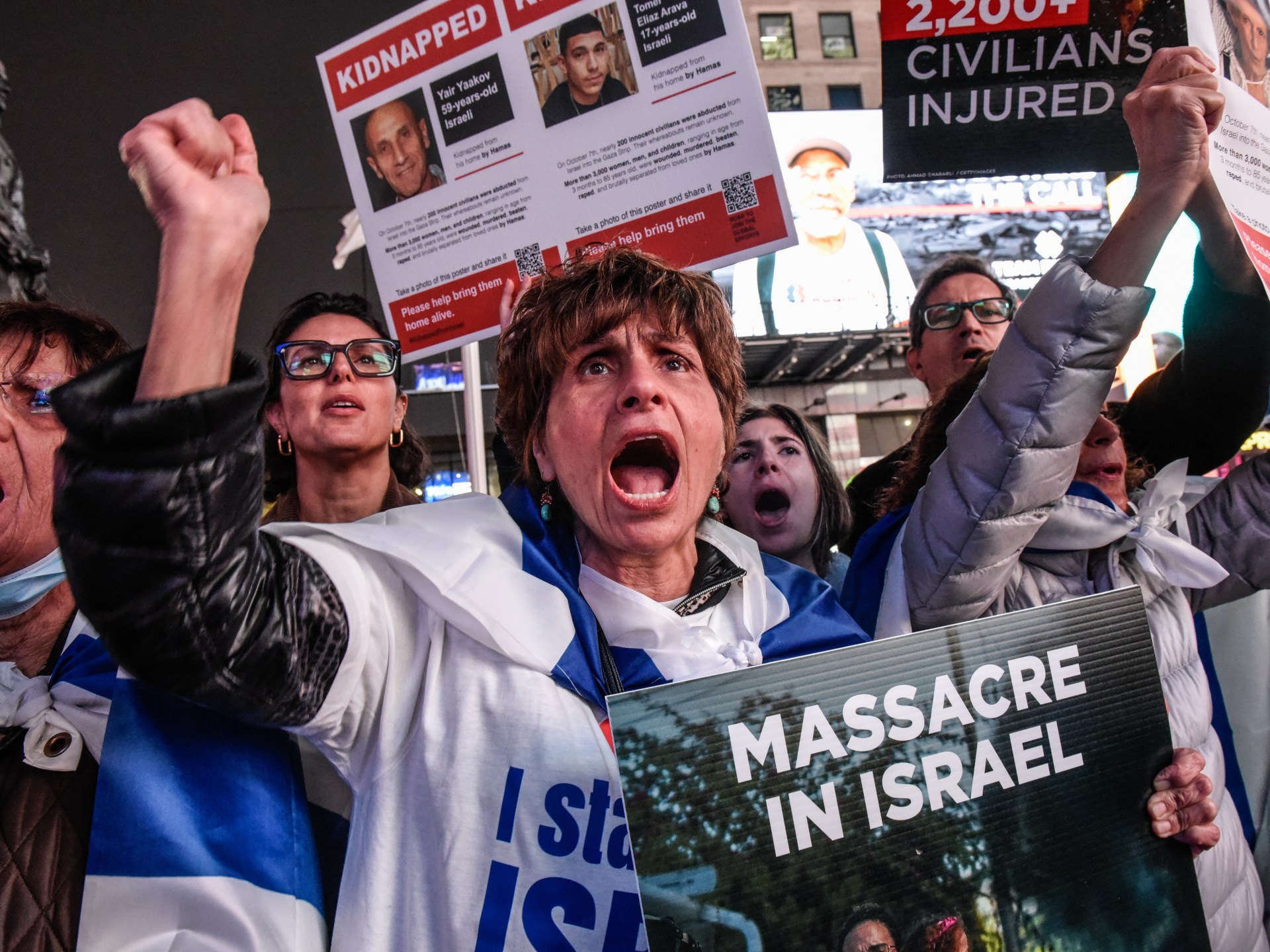
Publishing unsubstantiated claims, telling only one side of the story, and painting Palestinians as nothing more than objects in Hamas’s hands are all unprofessional mistakes Western media makes while covering the conflict between Israel and Hamas, media experts and Arab journalists say.
Experts and journalists who spoke to Al Jazeera said the systemic “bias in favour of Israel” is “irreparably damaging” the credibility of news agencies considered “mainstream” in the eyes of Arabs and others.
As Western media organisations “dehumanise Palestinians” and “legitimise Israeli violations of international law” as Israel bombs Gaza, it is glaringly obvious that the vital historical context of the trauma Palestinians have been through for the past 75 years is being left out, experts say.
One-sided
On October 7, Hamas launched an unprecedented attack on military outposts and communities in southern Israel, killing more than 1,400 Israelis and taking more than 200 hostages back to Gaza, according to Israeli officials.
The same day, Israel launched a relentless bombardment of Gaza that has killed more than 8,000 people, about 40 percent of whom are children.
It also devastated Gaza’s health sector and flattened much of its infrastructure while strengthening its choke-hold siege by cutting off fuel, water and food – acts that may amount to war crimes under international humanitarian law.
United Nations experts say Palestinians in Gaza are facing the risk of genocide.
Western correspondents have gone to Israel where they reported extensively on the grief of Israeli families, but Israel has not allowed foreign journalists to enter Gaza, which means they’re missing a vital aspect of the story.
“If you don’t live in Gaza, if you don’t listen to the prayers Palestinians make when they lose loved ones, if you don’t learn about the life story of loved ones [who have been killed] …then the coverage [of Gaza] won’t be the same [as the coverage of Israel],” Taghreed El-Khodary, an analyst from Gaza, told Al Jazeera from her home in the Netherlands.
This means, she continued, that they “are not just covering the Israeli narrative, but they are living the Israeli narrative”.
When one trauma trumps another
Most of the people within Gaza are the children or grandchildren of Palestinians who were expelled from their homeland during the creation of Israel in 1948 – an event commemorated annually as the “Nakba” or catastrophe.
Rights groups refer to Gaza, where 2.3 million people are squeezed into a piece of land only 41km (25 miles) long and 10km (6 miles) wide, as the largest “open-air prison” in the world.
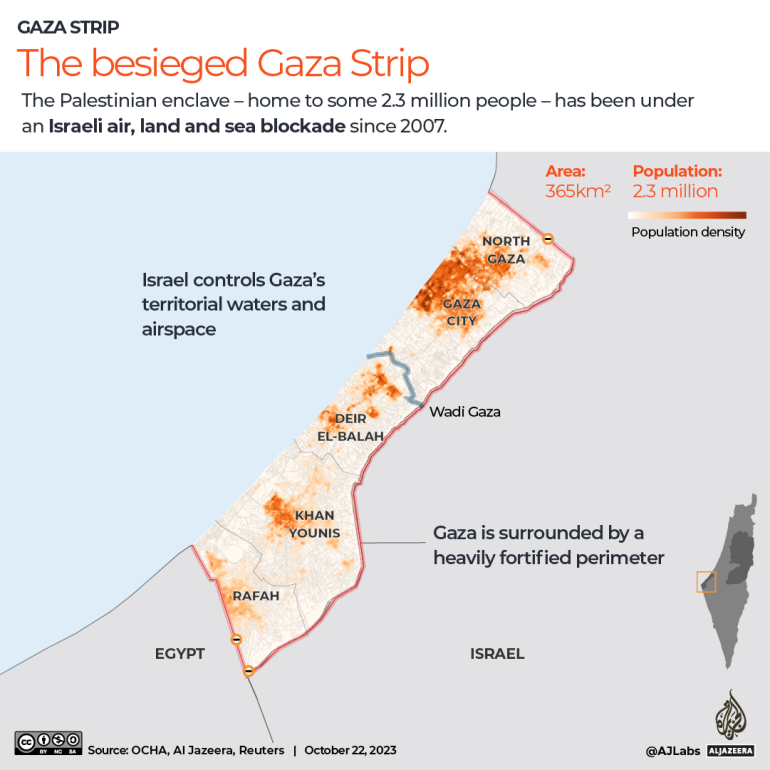
“You don’t hear the word ‘victims’ [in reference to Palestinians] as you hear [when there is reporting] about the Israeli side,” El-Khodary explained.
Rather than cover the human toll in Gaza, many Western media networks either refer to the Palestinians killed as numbers or echo American and Israeli talking points including Israel’s “right to defend” itself and Hamas using civilians in Gaza as “human shields”.
According to international law, Israel is an occupying force in the West Bank and Gaza. For decades, it has built and expanded illegal settlements in the former. It has maintained a suffocating siege on the latter since 2007.
Amnesty International has pointed to what it terms “damning evidence of war crimes as Israeli attacks wipe out entire families in Gaza”. Satellite imagery shows whole neighbourhoods in Gaza that have been flattened.
These “double standards” reflect a broader tendency of Western media organisations to portray Muslims and Arabs as “less than human”, said Arwa Damon, a former CNN correspondent and now a nonresident senior fellow at the Atlantic Council, a Washington, DC, think-tank.
“What we are seeing right now is a repeat – especially in terms of coverage – of what we saw on 9/11 where [Arabs and Muslims] were painted with this ‘terrorist’ brush and vilified,” she said.
Palestinians invited to speak to Western news channels are frequently asked if they “condemn Hamas”, while Israeli guests are seldom asked to condemn their government’s apartheid policies in the occupied West Bank or its siege and bombardment of Gaza, experts told Al Jazeera.
“In every [Western news] report, they keep mentioning that Hamas is [designated] a terrorist group,” said El-Khodary. “But what about mentioning what Israel is doing? It’s violating international law, it’s committing genocide. It has imposed an apartheid system [in the West Bank]. It has imposed a 16-year blockade on Gaza.”
“Where is the context? Only that Hamas is [a designated terrorist group] and that is the only context they are giving us here.”
Manufacturing support
Unsubstantiated claims made by Israeli parties have made their way to the front pages of Western news agencies, according to the experts Al Jazeera spoke to. A recent example was the oft-reported claim that Hamas “beheaded 40 babies”.
Despite the lack of evidence, the allegations were reported by The Independent, CNN, Fox News and the New York Post.
Even United States President Joe Biden implied he had seen pictures of dismembered babies on October 12. The White House later walked back his comments, saying Biden had seen no such images, and that he had seen news reports.
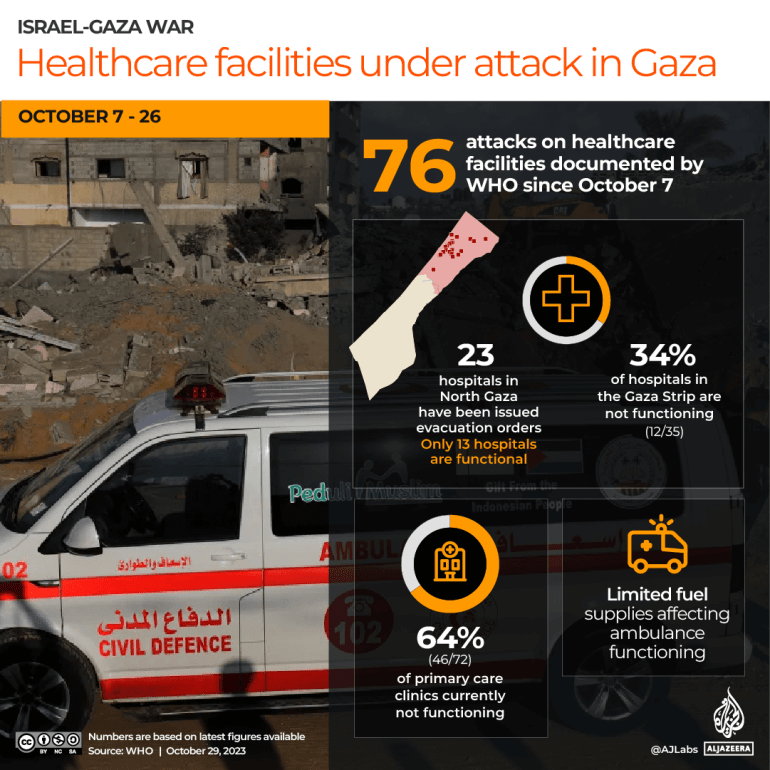
That claim – and other unsubstantiated allegations like Hamas fighters raping hundreds of Israeli women – was an attempt to manufacture public support for Israel’s military response in Gaza, said Lina Mounzer, a Lebanese writer and critic who has written for major Western news organisations.
While an Amnesty International report concluded that children were killed in Hamas’s attack, neither Israeli authorities, Western journalists nor rights groups found any evidence of “beheaded babies”.
“When [Western outlets] focus on these claims of 40 beheaded babies and women being gang-raped, then what they are effectively doing is justifying the brutality of Israel’s counterattack,” Mounzer told Al Jazeera.
“How else do you sell the idea of self-defence when [Israel] is bombing what is basically a concentration camp?”
Fired for empathy
While some journalists at Western outlets may want to do more thorough reporting, many actually fear losing their livelihoods and careers if they speak out against their network’s pro-Israel bias, said Layla Maghribi, a British freelance journalist of Palestinian-Syrian descent.
A non-Jewish Arab colleague of hers, she told Al Jazeera, has been instructed by their news outlet not to attend any demonstrations or post anything on social media that suggests he empathises with Palestinians.
Her Jewish colleague, she continued, hates that he cannot tell his readers about the real human cost of Israel’s bombing of Gaza.

“My Jewish colleague is just mortified with his editor’s coverage of the conflict. That is, if you can even call it a conflict. It’s a massacre,” Maghribi said.
Other journalists who are not reporting on the conflict have been fired for comments or actions that imply empathy with victims in Gaza.
Michael Eisen, a Jewish journalist who was employed by the open-source scientific journal eLife, said he lost his job for sharing a headline on X (formerly Twitter) from the US satirical news website The Onion.
“Dying Gazans criticised for not using last words to condemn Hamas,” read The Onion headline, which was published on October 13.
Journalists at the BBC are understood to have objected to the United Kingdom broadcaster’s framing of the war in Gaza.
While the BBC has used words such as “massacre”, “slaughter” and “atrocities” when describing Hamas’s attack on Israel, it has refrained from describing Israel’s bombardment of Gaza in a similarly negative way, according to an email that staff at the network sent to Director-General Tim Davie, the UK’s Times reported.
Maghribi says she believes the climate of intimidation against journalists and the failure of mainstream outlets to humanise Palestinians is causing the Arabic-speaking world and Arab diaspora in the West to lose even more faith in the credibility of Western media coverage.
“We’re not just witnessing a breakdown in humanity,” she said. “We are witnessing a breakdown in the profession.”

World
Kelsey Grammer Slams Paramount+ for Frasier Cancellation: ‘They Didn’t Really Promote It’

ad
World
Pope Francis in stable but 'guarded' condition, according to Vatican
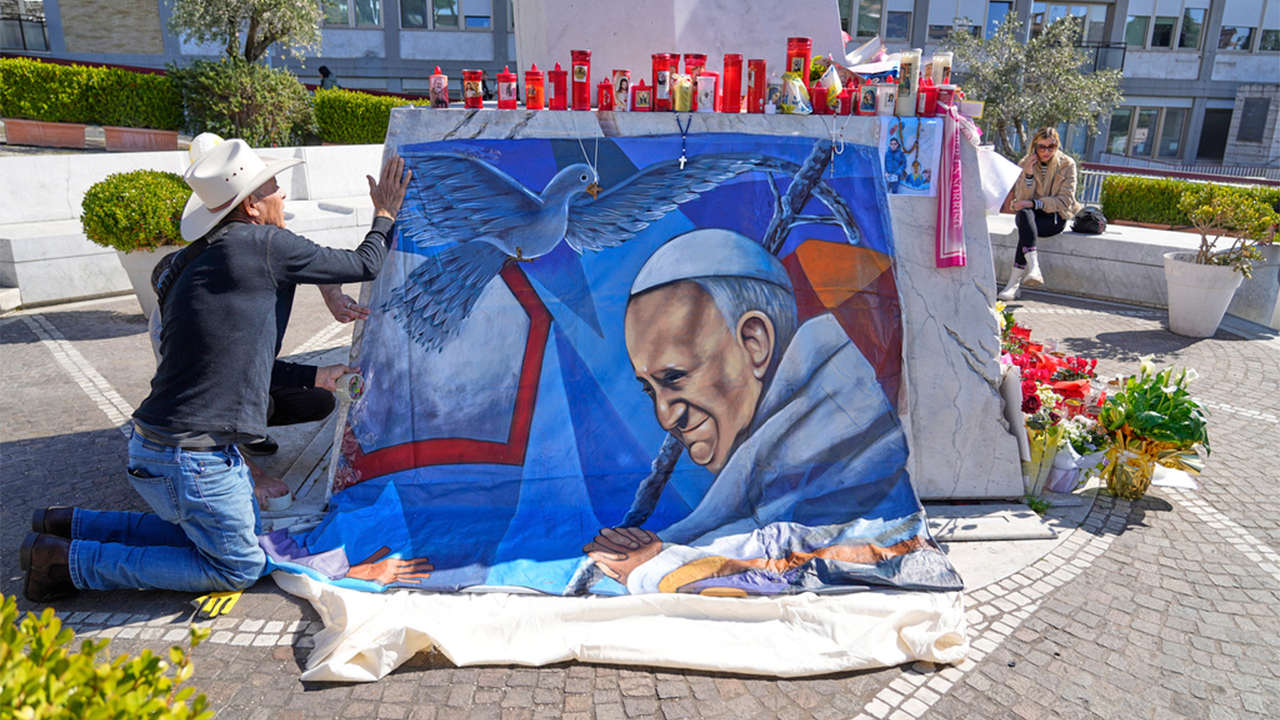
Pope Francis’ condition remained stable and “guarded” Thursday, a day when the pontiff did not have difficulty breathing and remained fever-free.
The pope had a “good night” and continued physical therapy at Rome’s Gemelli hospital for his third week of treatment for double pneumonia, the Vatican said Thursday.
“Today, the Holy Father dedicated himself to some work activities during the morning and afternoon, alternating rest and prayer,” the Vatican said. “Before lunch, he received the Eucharist.”
The next update will come Saturday, the Vatican said, because of his stable condition.
CHRISTIANS USE HALLOW APP’S PRAY40 CHALLENGE AMONG OTHER TRADITIONAL WAYS TO GROW CLOSER TO GOD AS LENT BEGINS
Pope Francis waves from the central loggia of St. Peter’s basilica during the Easter ‘Urbi et Orbi’ message and blessing to the City and the World as part of the Holy Week celebrations, in the Vatican on March 31, 2024. (Tiziana Fabi/Pool/AFP/Getty)
“The night passed quietly; the Pope is still resting,” the Holy See press office said earlier Thursday, adding that the Pope’s “clinical condition has remained stable for the last couple of days, and his doctors say he has not had more episodes of respiratory insufficiency.”
The 88-year-old pope, who has chronic lung disease and had part of one lung removed as a young man, has been stable for two days after suffering a pair of respiratory crises on Monday. Doctors underlined that his prognosis remained guarded due to the complex picture.
In recent days, he has been sleeping with a non-invasive mechanical mask to guarantee that his lungs expand properly overnight and help his recovery. He has been transitioning to receiving oxygen with a nasal tube during the day.
The pope on Wednesday marked the start of Lent by receiving ashes on his forehead and by calling the parish priest in Gaza, the Vatican said. He also added physical therapy to his hospital routine of respiratory therapy.
The Catholic Church opened the solemn Lenten season without the pope’s participation. A cardinal took his place leading a short penitential procession between two churches on the Aventine Hill and opened an Ash Wednesday sermon prepared for the pontiff with words of solidarity and thanks.
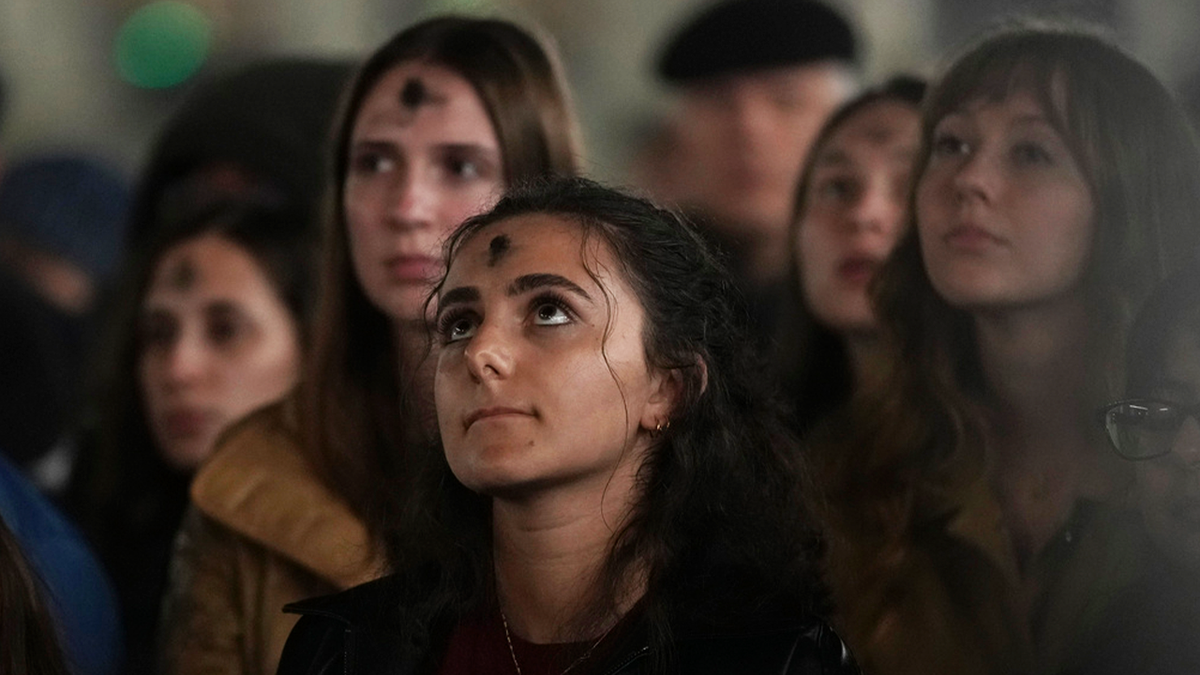
Girls, with ashes on their foreheads, pray during a rosary prayer for Pope Francis’ health in St. Peter’s Square at the Vatican, Wednesday, March 5, 2025. (AP Photo/Alessandra Tarantino)
On Ash Wednesday, observant Catholics receive a sign of the cross in ashes on their foreheads, a gesture that underscores human mortality. It is an obligatory day of fasting and abstinence that signals the start of Christianity’s most penitent season, leading to Easter on April 20.
The pope was supposed to attend a spiritual retreat this weekend with the rest of the Holy See hierarchy. On Tuesday, the Vatican said the retreat would go ahead without Francis but in “spiritual communion” with him. The theme, selected before Francis got sick, was “Hope in eternal life.”
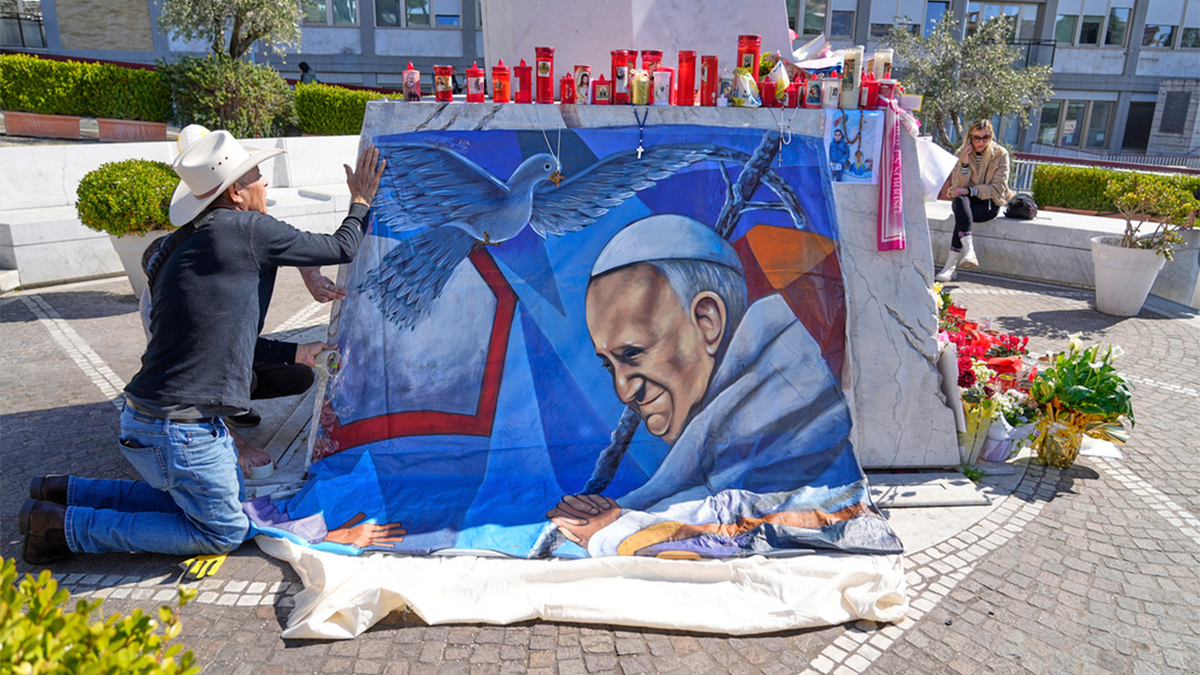
Mexican painter Roberto Marquez places a painting of Pope Francis he made outside the Agostino Gemelli hospital in Rome on Ash Wednesday. (AP Photo/Gregorio Borgia)
The Associated Press contributed to this report.
World
Trump again spreads baseless claims about Trudeau, Canada’s election

US president accuses outgoing Canadian prime minister of seeking to use issue of tariffs to extend his time in office.
United States President Donald Trump has reiterated baseless claims that outgoing Canadian Prime Minister Justin Trudeau is seeking to use US tariffs against Canada to extend his time in office, as a rift widens between the two countries.
In a social media post on Thursday, Trump said he believed Trudeau “is using the Tariff problem, which he has largely caused, in order to run again for Prime Minister”.
“So much fun to watch!” the US president wrote.
The remark follows a similar post Trump shared on his Truth Social website on Wednesday, accusing Trudeau of using trade tensions as a way “to stay in power”.
“He was unable to tell me when the Canadian Election is taking place, which made me curious, like, what’s going on here? I then realized he is trying to use this issue to stay in power. Good luck Justin!” Trump wrote.
Tensions have soared between the two leaders since Trump first threatened late last year to impose steep tariffs on Canadian goods if Trudeau’s government did not do more to stem irregular migration and drug trafficking over its border with the US.
This week, the Trump administration followed through on its plans and imposed 25-percent tariffs on most Canadian imports, as well as 10-percent levies on oil and gas.
Canada responded by announcing it would be implementing 25-percent tariffs against $106bn (155 billion Canadian) worth of US goods. Tariffs on $21bn (30 billion Canadian) came into immediate effect on Tuesday.
“This is a very dumb thing to do,” Trudeau told reporters on Tuesday of the US measures, which he described as an unjustified “trade war against Canada”.
Trudeau, who has been Canada’s prime minister since 2015, is set to step down as leader of the governing Liberal Party after it chooses its next leader on Sunday.
The new leader is expected to assume the duties of prime minister after a short transition period.
Asked during a news conference on Thursday whether he would consider staying on as prime minister in a caretaker role to help manage the uncertainty surrounding US tariffs, Trudeau said: “No. I will not be.”
He added, “I look forward to a transition to my duly elected successor in the coming days or week.”
Meanwhile, some experts in Canada have said Trump’s attack on Trudeau underscores his ignorance of the country’s political system.
Stewart Prest, a political science professor at the University of British Columbia, said on social media that the US president’s remarks represent “a reckless disregard for the Canadian democratic system”.
“To be clear, Trudeau will step aside after the Liberal leadership race,” Prest wrote on the social media platform Bluesky on Wednesday.
Under Canadian electoral rules, the next federal election must be held by October 20.
But the Liberals, as the party in government, can choose to trigger a vote before then.
An election could also be called earlier if opposition parties pass a vote of no confidence in Canada’s Parliament, which is set to resume on March 24.
As it currently stands, no election date has been formally set.
“Parliamentary democracy is by design more flexible than the American presidential system, with its fixed election dates,” Prest explained.
“That’s deliberate, as it makes it much easier to get rid of a leader who is either unfit or unpopular – or both.”
Many experts have speculated that the Liberals may choose to call a vote shortly after their next leader is chosen in an effort to capitalise on a recent upswing in public support.
At the beginning of the year, the Liberals had been trailing the opposition Conservatives by as many as 26 percentage points.
But Trudeau’s decision to resign – coupled with the race to select his replacement as Liberal leader and Trump’s threats against Canada – have helped the party bounce back in the polls.
-

 Sports1 week ago
Sports1 week agoNHL trade board 7.0: The 4 Nations break is over, and things are about to get real
-

 News1 week ago
News1 week agoJustice Dept. Takes Broad View of Trump’s Jan. 6 Pardons
-

 World1 week ago
World1 week agoHamas says deal reached with Israel to release more than 600 Palestinians
-

 Science1 week ago
Science1 week agoKilling 166 million birds hasn’t helped poultry farmers stop H5N1. Is there a better way?
-

 News1 week ago
News1 week agoChristianity’s Decline in U.S. Appears to Have Halted, Major Study Shows
-
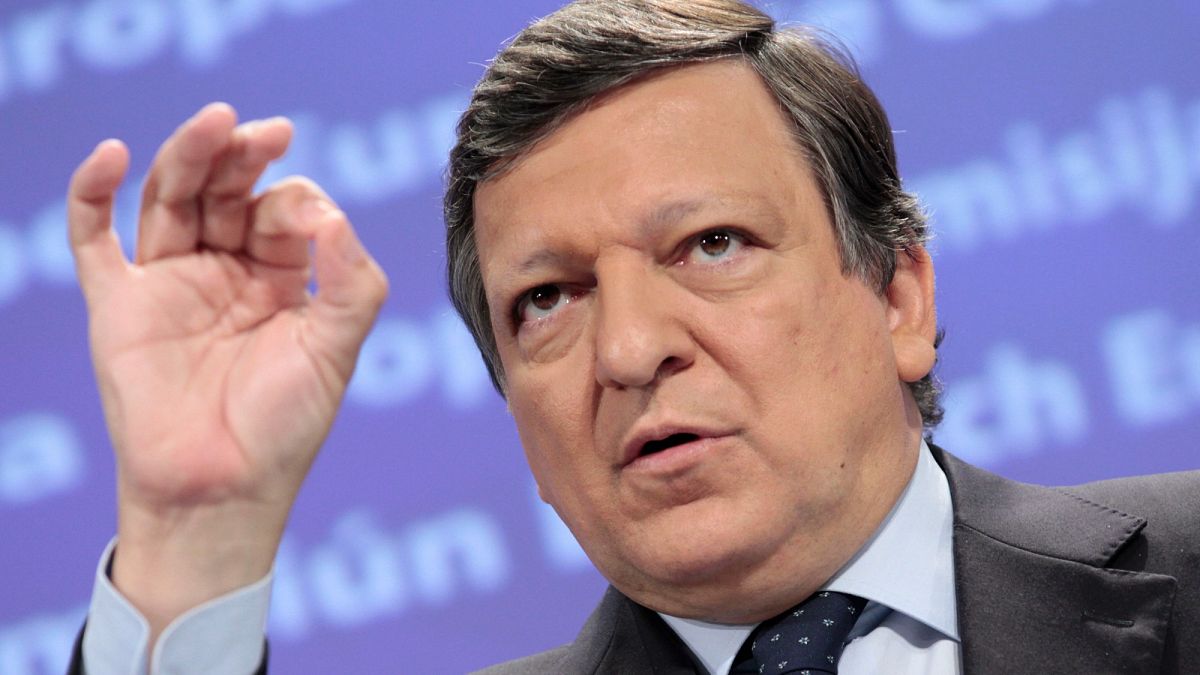
 World1 week ago
World1 week agoGermany's Merz ‘resolute and determined,' former EU chief Barroso says
-

 Technology1 week ago
Technology1 week agoMicrosoft makes Copilot Voice and Think Deeper free with unlimited use
-

 Culture1 week ago
Culture1 week agoOstriches, butt cheeks and relentless energy: How Austin Hedges became an indispensable MLB teammate














